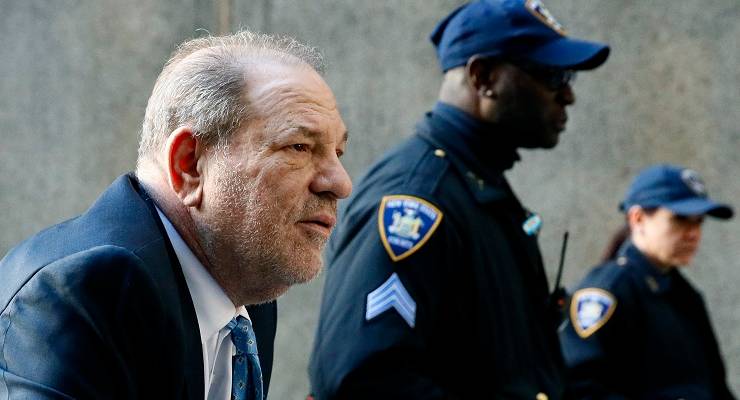
Australia is finally having the Me Too moment that was snuffed out by defamation laws a few years back. Journalism is finally doing what it should in this key moment: giving women the platform to tell their stories, providing space for men to defend their reputation if they choose, holding the government to account for its shortcomings.
Yet instead of celebrating this, too many of the industry’s old bull elephants are busy huffing and puffing about pile-ons and trials by media and sewer rats on Twitter. They’re facing the police inability to convict with a shrugging “what’re you going to do?” helplessness.
Op-ed pages are filled with a moral panic. Apparently an everyday workplace inquiry into a cabinet minister would be a profound risk to our democracy. And it’s not just the usual suspects among the News Corp commentariat blathering that things didn’t used to be this way. Even usually astute political reporters seem to have missed what’s going on.
“We’ll still never really know what happened,” concluded the AFR’s Phil Coorey on Friday. “[It’s a] denial of natural justice,” mourned Peter van Onselen in The Weekend Australian.
Sure, these are confusing times. All the old ways of understanding news and news sources have been thrown up in the air. Social media has robbed journalism and politicians alike of their gatekeeping roles — but Australia and its media are going to be better for the understanding this particular news cycle is going to leave behind.
From its explosion with The New York Times Harvey Weinstein exposés in 2017, Me Too was built off the recognition that women bring the credibility of lived experiences to their stories about sexual discrimination, harassment and assault. Their stories should be taken as seriously as more traditional sources of prime ministers or sports stars: that is, carefully interrogated, analysed, tested — and reported if found credible. (Journalistically, that was what #believewomen always meant.)
Any story begins with a hard-headed assessment of the source. The new generation of (mainly — but not exclusively — women) journalists have grasped that just as Me Too has powered the credibility of women telling their stories, it has cost male politicians the institutional credibility to assert control of the political narrative.
At the same time, powerful men have retained the ability to command public platforms — including live television, as Australia saw this week. Journalists have always had the obligation to provide a platform to those challenging that power.
Journalism already has a practical tool to manage this clash of credibilities, where basic facts are in dispute: a reporting that balances the woman’s right to tell her story and the man’s right to defend his reputation. Sure it can end up a bit “she said, he said”, but sometimes that’s the best journalism can do.
It’s tricky, and a misstep can be costly. Defamation law exists to prioritise reputation over public debate (although last month an Indian court found the “right of reputation can’t be protected at the cost of right to dignity” of women in a high-profile Me Too case involving a federal minister).
In Australia, journalists have been careful to step around the increasingly stringent court interpretations of defamation. There was the tentative reporting of the letter over the first weekend, followed by a cautious unfolding of details that didn’t identify the minister on the Monday and Tuesday, before reaching the safer ground of police reports and prime ministerial comments.
Today’s financially strapped media companies are more cautious than they once were, particularly when they discovered that their defamation defender of choice, MinterEllison’s Peter Bartlett, was advising the minister. (Note: Bartlett also gives legal advice to Crikey.)
Once there would have been a competitive edging to the “scoop” of naming the man. This time there seems to have been a like-minded understanding that reticence was the safer option, until Christian Porter outed himself with an assertive “It just didn’t happen” denial.
That means Coorey is right: we may never reach a broadly accepted version of the truth. And repeated op-ed commentators in The Australian are right too: many people will independently decide what they believe to be true.
Welcome to the 2020s. If journalism empowers people to tell their stories, it also gives its audience the information they need to make up their mind.








“Social media has robbed journalism and politicians alike of their gatekeeping roles.”
And I suspect they don’t like it. Interestingly, those who were closer to, shall we say, centrist reporting are also being shown as just behind the curve, not getting it, and perhaps being bracketed these days in the same group as the more rabid right wing warriors.
Irrelevancy is their kryptonite. Their inside scoops from ‘disgruntled backbencher’ or ‘cabinet source’ cannot be trusted anymore. Too many times they have been used for partisan reasons, barely disguised in seemingly legitimate reporting, or just plain being used by the source for personal grudges or political favour.
As much as the internet, Facebook and Twitter are a force for distributing the most outlandish lies and misinformation campaign, it is relatively transparent compared to the gatekeepers of past.
The media has already moved on to Harry and Meghan. So should Croaky… All the hand-wringing and sobbing today is a real turn-off.